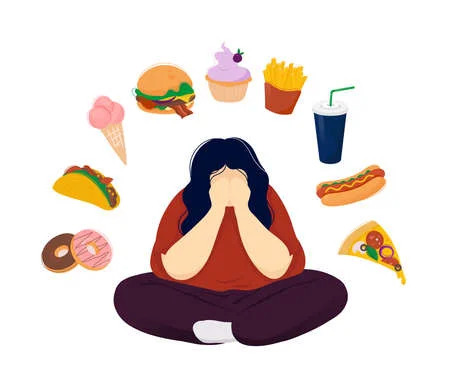Do you find yourself eating even when you’re not hungry? Do you feel like you can’t control what or how much you eat? If so, then you may be struggling with a food addiction. Compulsive eating is a real problem, and it can have serious consequences for your health and well-being. In this blog post, we will discuss the causes of compulsive eating and offer some tips for overcoming it.
Contents
Defining Compulsive Eating
Compulsive overeating is an eating disorder characterized by episodes of binge eating followed by feelings of guilt, shame, and distress. People who struggle with compulsive overeating often eat large amounts of food in a short period of time and feel that they can’t control their eating. Binge-eating episodes are usually accompanied by feelings of self-loathing and despair. Afterward, people often try to ” compensate” for their binge by purging (vomiting), fasting, or excessive exercise.
It is important to note that not all people who overeat are compulsive eaters. Overeating can be a normal response to certain situations, such as celebrations or holidays. Compulsive overeating is only considered a problem when it begins to interfere with your daily life and causes you distress.
Difference Between Compulsive Eating And Other Eating Disorders

Compulsive overeating is often confused with other eating disorders, such as bulimia nervosa and binge-eating disorder. However, there are some key differences between these disorders.
Bulimia nervosa is characterized by episodes of binge eating followed by purging (vomiting), fasting, or excessive exercise. People with bulimia nervosa typically have a normal body weight or are only slightly overweight. In contrast, people with compulsive overeating are usually obese.
Binge-eating disorder is similar to compulsive overeating, but it does not involve purging or other forms of compensation. People with binge-eating disorder often eat large amounts of food in a short period of time and feel that they can’t control their eating. However, they do not make up for their binge by purging or fasting. As a result, people with binge-eating disorder are usually obese.
Although there are overlapping features, compulsive overeating is a distinct disorder with its own set of causes and consequences.
Signs And Symptoms

There are a number of signs and symptoms that may indicate that you are struggling with compulsive overeating. These include:
- Eating more food than usual in a short period of time
- Feeling that you can’t control your eating
- Eating even when you’re not hungry
- Eating to the point of discomfort or pain
- Feeling guilty, ashamed, or distressed about your eating habits
- Bingeing on high-calorie foods or “junk” foods
- Trying to “compensate” for binge eating episodes by purging, fasting, or excessive exercise
- Avoiding social situations because you’re afraid of being seen eating
These are some of the more common signs and symptoms of compulsive overeating. It must be kept in mind that everyone experiences this disorder differently. Some people may only experience a few of these symptoms, while others may experience all of them.
Causes
There is no single cause of compulsive overeating. Rather, it is thought to be the result of a combination of factors, including:
Lifestyle
People who have busy, stressful lifestyles are more likely to develop compulsive eating habits. This is because they often turn to food as a way to cope with stress.
On the contrary, people who have sedentary lifestyles are also at risk of developing compulsive eating habits. This is because they may eat out of boredom or use food as a way to relieve boredom.
Biological factors
Some research suggests that there may be a genetic component to compulsive eating. People with close relatives who have struggled with eating disorders or obesity may be more likely to develop an eating disorder themselves.
Furthermore, some research suggests that compulsive overeating may be caused by a difference in the way the brain processes food. For example, people who struggle with compulsive overeating often have lower levels of the “feel-good” hormone serotonin. This difference may be due to a genetic predisposition or an imbalance of certain hormones or neurotransmitters.
Research studies also suggests that compulsive overeating may be linked to certain genes that affect how the brain responds to food cues. These genes may make people more sensitive to the sights and smells of food, which can trigger an uncontrollable urge to eat. This is common in people with ADHD and Autism.
Psychological factors

Certain psychological factors, such as low self-esteem, depression, anxiety, and stress, can contribute to compulsive overeating. It may also be a way to cope with difficult emotions or situations.
Similarly, people who were subjected to emotional or physical abuse as children may be more likely to develop compulsive eating habits. This can take the form of using food as a way to cope with the trauma or using food as a way to gain control over their lives.
Social factors
Social pressures and messages about body image can contribute to compulsive overeating. The media often portray thinness as the ideal body type, which can lead people to believe that they need to be thin in order to be happy and successful. This pressure can be especially difficult for people who are already struggling with their weight.
One can develop food-related disorders from any of the above-listed causes. It is important to acknowledge and honor the causes, as it is the first step to healing.
Consequences
If left untreated, compulsive overeating can lead to a number of serious physiological problems, including:
- High blood pressure
- High cholesterol
- Malnutrition
- Electrolyte imbalance
- Heart disease
- Breathing disorders
- Type II diabetes
- Certain types of cancer
- Sleep disorders
- Gastrointestinal problems
It may also manifest as mental health concerns, which can lead to the development of disorders such as:
- Anxiety
- Depression
- Bipolar disorder
- Obsessive-compulsive disorder (OCD)
- Substance abuse disorders
- Eating disorders such as anorexia nervosa and bulimia nervosa
Additionally, it can hamper the quality of life by having negative impacts on other domains of life such as:

- Interpersonal relationships: People who struggle with compulsive overeating often have difficulty maintaining healthy relationships. This is because the disorder can lead to isolation and social withdrawal.
- Work or school performance: Compulsive overeating can interfere with work or school performance. This is because the disorder can lead to fatigue, absenteeism, and low productivity.
- Financial stability: The cost of food can add up quickly, especially if someone is eating large amounts of food frequently. Additionally, compulsive overeating can lead to job loss or financial instability due to the aforementioned factors.
- Ability to enjoy activities and hobbies: Compulsive overeating can make it difficult to enjoy activities and hobbies. This is because the disorder can lead to a lack of energy, motivation, and interest.
Compulsive overeating is a serious disorder that can have a negative impact on every aspect of life. If you or someone you know is struggling with compulsive overeating, please seek professional help.
Treatment
Compulsive overeating is a serious problem, but it is treatable. If you think you may be struggling with compulsive overeating, it is important to seek professional help. Treatment for compulsive overeating typically includes some combination of professional intervention and self-help strategies.
Professional Help
Professional help for compulsive eating can be from a mental health professional, a nutritionist, or both.
A nutritionist can help you develop a healthy relationship with food. They can also help you develop healthy eating habits and an appropriate diet. Some of the most effective tools used by nutritionists include:
- Nutrition education
- Meal planning
- Food journaling
A mental health professional can help you identify and address the underlying causes of your compulsive eating. They can also help you develop healthy coping mechanisms for dealing with difficult emotions or situations. Some of the most effective tools used by mental health professionals include:
- Cognitive behavioral therapy (CBT)
- Dialectical behavior therapy (DBT)
- Interpersonal therapy (IPT)
- Medication (in severe cases)
Oftentimes, a psychologist and nutritionist may also collaborate to provide the most comprehensive and effective treatment for compulsive overeating.
Self-Help Strategies

In addition to professional help, there are a number of self-help strategies that can be used to treat compulsive overeating. Some of the most effective self-help strategies include:
- Enhancing self-love: One of the most important things you can do for yourself is to learn to love and accept yourself. This includes accepting your body as it is.
- Eating mindfully: Eating mindfully means being present while you eat. It means being aware of the taste, texture, and smell of the food. It also means being aware of your hunger and fullness cues. This process can also include chewing slowly, and savoring each bite.
- Identifying triggers: Triggers are things that prompt an urge to eat even when you’re not hungry. Common triggers include emotions, certain situations, and certain types of food. Once you identify your triggers, you can develop coping mechanisms for dealing with them.
- Planning meals: This means taking the time to plan out your meals and snacks in advance. This can help you avoid making impulsive decisions about food.
- Avoiding dieting: Dieting often leads to restrictive eating, which can trigger compulsive overeating. Instead of dieting, focus on developing healthy eating habits.
- Practicing portion control: This means eating smaller meals and snacks throughout the day. It can also mean avoiding “all-or-nothing” thinking when it comes to food.
- Engaging in physical activity: Physical activity can help reduce stress, improve mood, and increase energy levels. All of these things can help reduce the urge to eat in response to emotions or triggers.
- Developing a support system: A support system can be invaluable when struggling with any kind of problem. When it comes to compulsive overeating, a support system can provide emotional and practical support.
Compulsive overeating is a serious problem, but it is treatable. If you think you may be struggling with compulsive overeating, please seek professional help. With treatment and support, it is possible to overcome a compulsive eating disorder and lead a healthy and fruitful life.
Conclusion
In conclusion, compulsive overeating is a serious problem that can be effectively treated with professional help and self-help strategies. If you think you may be struggling with compulsive overeating, please seek help from a qualified mental health professional or nutritionist. With treatment and support, you can overcome a compulsive eating disorder and lead a healthy and fulfilling life. There is no shame in seeking help, and there is no reason to suffer in silence.
If you are looking for an inclusive, safe, effective, and also an affordable source for seeking support and guidance for eating disorders or any other mental health concern, reach out to Mantra Care! We have a team of expert mental health professionals from all across the world providing the best quality treatment for your mental health. You can contact us to book a session or you can also download our free Android or iOS app for more information!


